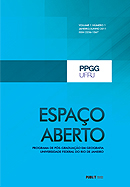The Meanings of Urbanization: Spatial Production of Labor Neighborhoods in the Cities of São Paulo State, Brazil
DOI:
https://doi.org/10.36403/espacoaberto.2015.3313Keywords:
Labor Neighborhoods, Agribusiness Cities, Spatial Production, Metropolitanization, Labor Crisis.Abstract
This paper presents a proposal for the interpretation of the historical process of the constitution of neighborhoods for laborers in the Brazilian state of Sao Paulo up to the present moment. First we start with an analysis of the labor system of the colonato used in coffee cropping and the production of space articulated to estate expansion as well as the formation of colonial nuclei within the province of Sao Paulo. These processes are understood as contradictory moments towards metropolitanization of the capital. In the second part, we discuss the gradual opposition that arose between the peripheries of cities in the interior to those in the metropolis, resulting from the dissolution of the colonato system and the tendency toward a sort of homogenization of social relations of production both in urban and agricultural industries. We finally suggest a relative similarity between the conditions of social reproductions of inhabitants in the peripheries of cities in the state of Sao Paulo from the point of view of labor crisis and critical urbanization.



